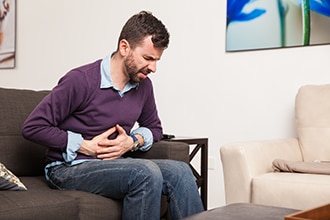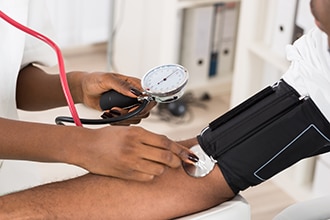Viral Gastroenteritis (“Stomach Flu”)
Return to Overview PageDefinition & Facts
In this section:
- What is viral gastroenteritis (“stomach flu”)?
- How common is viral gastroenteritis?
- Who is more likely to get viral gastroenteritis?
- What are the complications of viral gastroenteritis?
What is viral gastroenteritis (“stomach flu”)?
Viral gastroenteritis is an infection of your intestines that typically causes watery diarrhea, pain or cramping in your abdomen, nausea or vomiting, and sometimes fever.
Viral gastroenteritis is caused by viruses. Viruses invade normal cells in your body. Many viruses cause infections that can be spread from person to person.
People commonly call viral gastroenteritis “stomach flu,” but the term is not medically correct. Viral gastroenteritis is an infection of the intestines, not the stomach, and it is not caused by influenza (flu) viruses. The flu vaccine does not protect against viral gastroenteritis.
Viral gastroenteritis is acute, meaning it happens suddenly and lasts a short time. Most cases of viral gastroenteritis last less than a week, and most people get better on their own without medical treatment. In some cases, viral gastroenteritis may cause severe symptoms or may lead to dehydration.

How common is viral gastroenteritis?
Viral gastroenteritis is very common. Norovirus is the most common cause of viral gastroenteritis. In the United States, norovirus causes 19 to 21 million cases of viral gastroenteritis each year.1 Other viruses that cause gastroenteritis are less common.
Who is more likely to get viral gastroenteritis?
Anyone can get viral gastroenteritis. Some people are more likely to have severe symptoms, including
- infants and young children
- older adults
- people with a weakened immune system

What are the complications of viral gastroenteritis?
Dehydration is the most common complication of viral gastroenteritis. When viral gastroenteritis causes you to vomit or have diarrhea, your body loses fluids and electrolytes. If you don’t replace those fluids and electrolytes, you may become dehydrated. When you are dehydrated, your body doesn’t have enough fluids and electrolytes to work properly. See a list of symptoms of dehydration.
Dehydration is especially dangerous in children, older adults, and people with a weakened immune system. Without treatment, dehydration can lead to serious problems such as organ damage, shock, coma, or even death.
References
Symptoms & Causes
In this section:
- What are the symptoms of viral gastroenteritis?
- What are the symptoms of dehydration?
- Seek care right away
- What kinds of viruses cause viral gastroenteritis?
- Do flu viruses cause viral gastroenteritis (“stomach flu”)?
- Are viruses the only cause of gastroenteritis?
- How does viral gastroenteritis spread?
What are the symptoms of viral gastroenteritis?
The symptoms of viral gastroenteritis include
What are the symptoms of dehydration?
Symptoms of dehydration, the most common complication of viral gastroenteritis, may include the following in adults
- extreme thirst and dry mouth
- urinating less than usual
- feeling tired
- dark-colored urine
- decreased skin turgor, meaning that when a person’s skin is pinched and released, the skin does not flatten back to normal right away
- sunken eyes or cheeks
- light-headedness or fainting
If you are the parent or caretaker of an infant or young child with viral gastroenteritis, you should watch for the following signs of dehydration
- thirst
- urinating less than usual, or no wet diapers for 3 hours or more
- lack of energy
- dry mouth
- no tears when crying
- decreased skin turgor
- sunken eyes or cheeks
Seek care right away
In most cases, viral gastroenteritis is not harmful. However, viral gastroenteritis can become dangerous if it leads to dehydration. Anyone with signs or symptoms of dehydration should see a doctor right away. A person with severe dehydration may need treatment at a hospital.
Viral gastroenteritis symptoms may be similar to the symptoms of other health problems. Certain symptoms may suggest that a person has a different health problem.
The symptoms listed below may suggest that an adult or child has a severe case of viral gastroenteritis, dehydration, or a more serious health problem instead of viral gastroenteritis.
Adults
Adults with any of the following symptoms should see a doctor right away
- change in mental state, such as irritability or lack of energy
- diarrhea lasting more than 2 days
- high fever
- vomiting often
- six or more loose stools in a day
- severe pain in the abdomen or rectum
- stools that are black and tarry or contain blood or pus
- symptoms of dehydration
Adults should also see a doctor if they aren’t able to drink enough liquids or oral rehydration solutions—such as Pedialyte, Naturalyte, Infalyte, and CeraLyte—to prevent dehydration or if they do not improve after drinking oral rehydration solutions.
Older adults, pregnant women, and adults with a weakened immune system or another health condition should also see a doctor right away if they have any symptoms of viral gastroenteritis.
Infants and children
If an infant or child has signs or symptoms of viral gastroenteritis, don’t hesitate to call a doctor for advice. Diarrhea is especially dangerous in newborns and infants, leading to severe dehydration in just a day or two. A child with symptoms of dehydration can die within a day if left untreated.
If you are the parent or caretaker of an infant or child with any of the following signs or symptoms, seek a doctor’s help right away
- change in the child’s mental state, such as irritability or lack of energy
- diarrhea lasting more than a day
- any fever in infants
- high fever in older children
- frequent loose stools
- vomiting often
- severe pain in the abdomen or rectum
- signs or symptoms of dehydration
- stools that are black and tarry or contain blood or pus
You should also seek a doctor’s help right away if a child has signs or symptoms of viral gastroenteritis and the child is an infant, was born prematurely, or has a history of other medical conditions. Also seek a doctor’s help right away if the child is not able to drink enough liquids or oral rehydration solutions to prevent dehydration or if the child does not improve after drinking oral rehydration solutions.

What kinds of viruses cause viral gastroenteritis?
Many different viruses can cause viral gastroenteritis. The most common causes of viral gastroenteritis include
- norovirus. Norovirus is the most common cause of viral gastroenteritis. Symptoms usually begin 12 to 48 hours after you come into contact with the virus and last 1 to 3 days.2
- rotavirus. Symptoms usually begin about 2 days after you come into contact with the virus and last for 3 to 8 days.3 Vaccines can prevent rotavirus infection.
- adenovirus. Symptoms typically begin 3 to 10 days after you come into contact with the virus and last 1 to 2 weeks.4
- astrovirus. Symptoms typically begin 4 to 5 days after you come into contact with the virus and last 1 to 4 days.5,6
Norovirus causes infections in people of all ages. Rotavirus, adenovirus, and astrovirus most often infect infants and young children, but they can also infect adults.
Viruses may cause viral gastroenteritis any time of the year. In the United States, norovirus, rotavirus, and astrovirus are more likely to cause infections in the winter.
Do flu viruses cause viral gastroenteritis (“stomach flu”)?
Although some people call viral gastroenteritis “stomach flu,” influenza (flu) viruses do not cause viral gastroenteritis. Flu viruses cause infections of the respiratory system, while viral gastroenteritis is an infection of the intestines.
Are viruses the only cause of gastroenteritis?
No. While viruses cause viral gastroenteritis, bacteria, parasites, and chemicals may cause other kinds of gastroenteritis.
When gastroenteritis is caused by consuming foods or drinks contaminated with viruses, bacteria, parasites, or chemicals, this is called food poisoning.
How does viral gastroenteritis spread?
Viral gastroenteritis spreads from person to person through contact with an infected person’s stool or vomit.
If you have viral gastroenteritis, viruses will be present in your stool and vomit. You may spread the virus in small bits of stool or vomit, especially if you don’t wash your hands thoroughly after using the bathroom and
- touch surfaces or objects used by other people
- prepare or serve foods and drinks for other people
- shake hands with or touch another person
Infected people who do not have symptoms can still spread viruses. For example, norovirus may be found in your stool before you have symptoms and up to 2 weeks after you recover.2
Norovirus is especially contagious, meaning that it spreads easily from person to person. Norovirus can live for months on surfaces such as countertops and changing tables. When an infected person vomits, the virus may become airborne and land on surfaces or on another person.
Viral gastroenteritis may spread in households, day care centers and schools, nursing homes, cruise ships, restaurants, and other places where people gather in groups.
If water comes into contact with stools of infected people, the water may become contaminated with a virus. The contaminated water can spread the virus to foods or drinks, and people who consume these foods or drinks may become infected. People who swim in contaminated water may also become infected.
References
Diagnosis
How do doctors diagnose viral gastroenteritis?
Doctors often diagnose viral gastroenteritis based on your symptoms. If your symptoms are mild and last only a short time, you typically won’t need tests.
In some cases, a medical history, a physical exam, and stool tests can help diagnose viral gastroenteritis. Your doctor may perform additional tests to check for other health problems.
Medical history
Your doctor will ask you about your symptoms, for example
- what symptoms you have
- how long you have had symptoms
- how often you have had symptoms
Your doctor may also ask you about
- recent contacts with other people who are sick
- recent travel
- current and past medical conditions
- prescription and over-the-counter medicines you take
Physical exam
During a physical exam, your doctor may
- check your blood pressure and pulse for signs of dehydration
- examine you for signs of fever or dehydration
- use a stethoscope to listen to sounds in your abdomen
- tap on your abdomen to check for tenderness or pain

Sometimes, doctors perform a digital rectal exam. Your doctor will have you bend over a table or lie on your side while holding your knees close to your chest. After putting on a glove, the doctor will slide a lubricated finger into your anus to check for blood in your stool. Blood in your stool may be a sign of health conditions other than viral gastroenteritis that may be causing your symptoms.
Stool tests
A health care professional will give you a container for catching and storing the stool. You will receive instructions on where to send or take the container for analysis. Stool tests can show signs of infection, inflammation, and digestive diseases and disorders.
Treatment
How can I treat viral gastroenteritis?
In most cases, people with viral gastroenteritis get better on their own without medical treatment. You can treat viral gastroenteritis by replacing lost fluids and electrolytes to prevent dehydration. In some cases, over-the-counter medicines may help relieve your symptoms.
Research shows that following a restricted diet does not help treat viral gastroenteritis. When you have viral gastroenteritis, you may vomit after you eat or lose your appetite for a short time. When your appetite returns, you can most often go back to eating your normal diet, even if you still have diarrhea. Find tips on what to eat when you have viral gastroenteritis.
If your child has symptoms of viral gastroenteritis, such as vomiting or diarrhea, don’t hesitate to call a doctor for advice.
Replace lost fluids and electrolytes
When you have viral gastroenteritis, you need to replace lost fluids and electrolytes to prevent dehydration or treat mild dehydration. You should drink plenty of liquids. If vomiting is a problem, try sipping small amounts of clear liquids.
Most adults with viral gastroenteritis can replace fluids and electrolytes with liquids such as
- water
- fruit juices
- sports drinks
- broths
Eating saltine crackers can also help replace electrolytes.
If your child has viral gastroenteritis, you should give your child an oral rehydration solution—such as Pedialyte, Naturalyte, Infalyte, and CeraLyte—as directed to replace lost fluids and electrolytes. Oral rehydration solutions are liquids that contain glucose and electrolytes. Talk with a doctor about giving these solutions to your infant. Infants should drink breast milk or formula as usual.
Older adults, adults with a weakened immune system, and adults with severe diarrhea or symptoms of dehydration should also drink oral rehydration solutions.
Over-the-counter medicines
In some cases, adults can take over-the-counter medicines such as loperamide (Imodium) and bismuth subsalicylate (Pepto-Bismol, Kaopectate) to treat diarrhea caused by viral gastroenteritis.
These medicines can be unsafe for infants and children. Talk with a doctor before giving your child an over-the-counter medicine.
If you have bloody diarrhea or fever—signs of infections with bacteria or parasites—don’t use over-the-counter medicines to treat diarrhea. See a doctor for treatment.
How do doctors treat viral gastroenteritis?
Your doctor may prescribe medicine to control severe vomiting. Doctors don’t prescribe antibiotics to treat viral gastroenteritis. Antibiotics don’t work for viral infections.
In some cases, your doctor may recommend probiotics. Probiotics are live microbes, most often bacteria, that are like the ones you normally have in your digestive tract. Studies suggest that some probiotics may help shorten a case of diarrhea. Researchers are still studying the use of probiotics to treat viral gastroenteritis. For safety reasons, talk with your doctor before using probiotics or any other complementary or alternative medicines or practices.
Anyone with signs or symptoms of dehydration should see a doctor right away. Doctors may need to treat people with severe dehydration in a hospital.
How can I prevent viral gastroenteritis?
You can take several steps to keep from getting or spreading infections that cause viral gastroenteritis. Wash your hands thoroughly with soap and water
- after using the bathroom
- after changing diapers
- before and after handling, preparing, or eating food
You can clean surfaces that may have come into contact with infected stool or vomit, such as countertops and changing tables, with a mixture of 5 to 25 tablespoons of household bleach and 1 gallon of water.7 If clothes or linens may have come into contact with an infected person’s stool or vomit, you should wash them with detergent for the longest cycle available and machine dry them. To protect yourself from infection, wear rubber gloves while handling the soiled laundry and wash your hands afterward.7
If you have viral gastroenteritis, avoid handling and preparing food for others while you are sick and for 2 days after your symptoms stop.7 People who have viral gastroenteritis may spread the virus to any food they handle, especially if they do not thoroughly wash their hands. Contaminated water may also spread a virus to foods before they are harvested. For example, contaminated fruits, vegetables, and oysters have been linked to norovirus outbreaks. Wash fruits and vegetables before using them, and thoroughly cook oysters and other shellfish.7 Find tips to help keep food safe.
The flu vaccine does not protect against viral gastroenteritis. Although some people call viral gastroenteritis “stomach flu,” influenza (flu) viruses do not cause viral gastroenteritis. However, rotavirus vaccines can prevent viral gastroenteritis caused by rotavirus.
Rotavirus Vaccines
Two vaccines, which infants receive by mouth, are approved to protect against rotavirus infections8
- RotaTeq: Infants receive three doses, at ages 2 months, 4 months, and 6 months
- Rotarix: Infants receive this vaccine in two doses, at ages 2 months and 4 months
For the rotavirus vaccine to be most effective, infants should receive the first dose by 15 weeks of age. Infants should receive all doses by 8 months of age.
If you have a baby, talk with your baby’s doctor about rotavirus vaccination.
References
Eating, Diet, & Nutrition
What should I eat if I have viral gastroenteritis?
When you have viral gastroenteritis, you should drink plenty of liquids to replace lost fluids and electrolytes. You may vomit after you eat or lose your appetite for a short time. When your appetite returns, you can most often go back to eating your normal diet, even if you still have diarrhea.
When children have viral gastroenteritis, parents and caretakers should give children what they usually eat as soon as their appetite returns. Parents and caretakers should give infants breast milk or formula as usual.

What should I avoid eating if I have viral gastroenteritis?
Research shows that following a restricted diet does not help treat viral gastroenteritis. Most experts do not recommend fasting or following a restricted diet when you have viral gastroenteritis.
For some people, certain food ingredients may make symptoms such as diarrhea worse, including
- drinks with caffeine, such as coffee and tea, and some soft drinks.
- foods that are high in fat, such as fried foods, pizza, and fast foods.
- foods and drinks containing large amounts of simple sugars, such as sweetened beverages and some fruit juices.
- milk and milk products, which contain the sugar lactose. Some people recovering from viral gastroenteritis have problems digesting lactose for up to a month or more afterwards.
Clinical Trials
The National Institute of Diabetes and Digestive and Kidney Diseases (NIDDK) and other components of the National Institutes of Health (NIH) conduct and support research into many diseases and conditions.
What are clinical trials, and are they right for you?
Clinical trials are part of clinical research and at the heart of all medical advances. Clinical trials look at new ways to prevent, detect, or treat disease. Researchers also use clinical trials to look at other aspects of care, such as improving the quality of life for people with chronic illnesses. Find out if clinical trials are right for you.
Watch a video of NIDDK Director Dr. Griffin P. Rodgers explaining the importance of participating in clinical trials.
What clinical trials are open?
Clinical trials that are currently open and are recruiting can be viewed at ClinicalTrials.gov.
This content is provided as a service of the National Institute of Diabetes and Digestive and Kidney Diseases
(NIDDK), part of the National Institutes of Health. NIDDK translates and disseminates research findings to increase knowledge and understanding about health and disease among patients, health professionals, and the public. Content produced by NIDDK is carefully reviewed by NIDDK scientists and other experts.
The NIDDK would like to thank Mary Estes, Ph.D., Baylor College of Medicine

